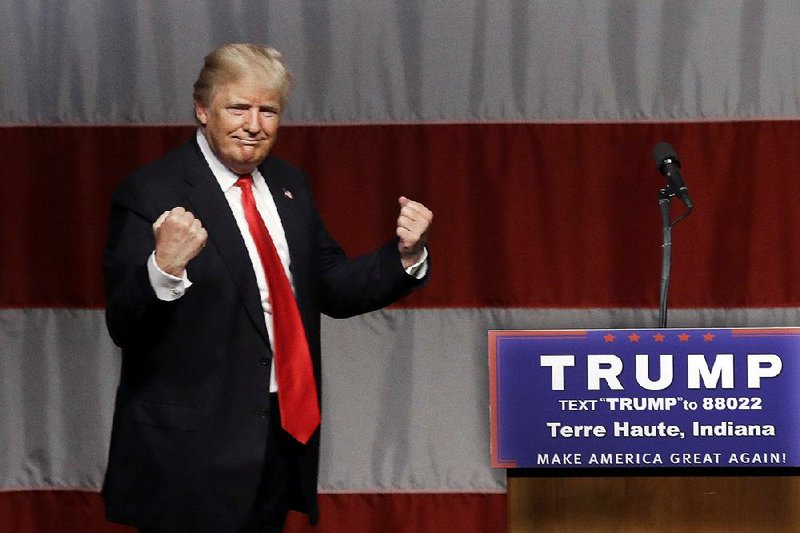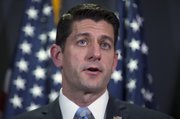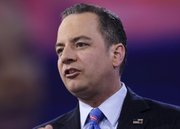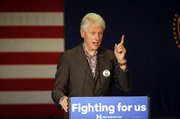WASHINGTON -- GOP leaders on Friday turned against Donald Trump, but the party's presumptive presidential nominee shrugged it off.
RELATED ARTICLE
http://www.arkansas…">Faulting Clinton on emails called elusive
FULL ELECTION COVERAGE
"The thing that matters most are the millions of people that have come out to vote for me and give me a landslide victory in almost every state," Trump said.
Trump agreed to meet next week with Paul Ryan, the House speaker who started the criticisms a day earlier when he said he was not ready to embrace Trump's nomination. Trump said he had "no idea" whether they would patch things up, adding that it wasn't all that important anyway.
"With millions of people coming into the party, obviously I'm saying the right thing," Trump said on Fox News. "I mean, he talks about unity, but what is this?"
Ryan said he would meet Thursday with Trump and that Trump also would meet with other House GOP leaders. Discussions will center on "the kind of Republican principles and ideas that can win the support of the American people this November," Ryan said.
Later Friday, one of Trump's former primary-race rivals said he would neither attend July's presidential nominating convention in Cleveland nor vote for Trump in November.
"I absolutely will not support Hillary Clinton for President," Sen. Lindsey Graham, R-S.C., said in a statement, referring to the Democratic front-runner. "I also cannot in good conscience support Donald Trump because I do not believe he is a reliable Republican conservative nor has he displayed the judgment and temperament to serve as commander in chief."
Trump responded by mocking Graham, saying, "Like the voters who rejected him, so will I!" Graham ended his presidential campaign before any votes were cast.
George H.W. Bush and his son, George W. Bush, the only former Republican presidents still living, said they would not back Trump's candidacy. Florida Gov. Jeb Bush also said he would not vote for Trump.
And Thursday night, Mitt Romney, the party's 2012 nominee, said at a private speech in Washington that he was "dismayed" by the state of the campaign.
"I wish we had better choices," Romney said. "I keep hoping that things will somehow get better."
Two senators, Ben Sasse of Nebraska and Jeff Flake of Arizona, have declined to endorse Trump in the general election. Sasse has called for a third-party campaign against Trump.
What's more, several Republican governors have indicated that they will not endorse Trump, including Charlie Baker of Massachusetts and, an aide confirmed, Bruce Rauner of Illinois.
Democrats are generally steering clear of the Republican infighting.
But Clinton, speaking in Oakland, Calif., called Trump the GOP's "presumptive nominee" as well as its "presumptuous nominee." She said he doesn't care about equal pay for women "because he doesn't think much of women, it turns out."
And President Barack Obama said when questioned about Trump: "This is not entertainment. This is not a reality show."
"I just want to emphasize the degree to which we are in serious times," Obama said during a news conference at the White House. "This is not entertainment. ... This is a contest for president of the United States."
Obama implored reporters to dig into the statements and policy proposals of candidates.
"Taking a position where you threaten war, where you're upending critical relations with other countries or you would potentially break the financial system -- that needs to be reported on," he said.
Obama's concerns followed Trump's suggestion that he might seek to pay back investors in U.S. government debt less than they were owed in order to get a better deal.
"I am the king of debt. I do love debt. I love debt. I love playing with it," Trump said on CNBC. He has used the bankruptcy laws on several occasions to reduce his companies' debts.
"I have borrowed, knowing that you can pay back with discounts. And I have done very well," Trump said. "I would borrow, knowing that if the economy crashed, you could make a deal. And if the economy was good, it was good. So, therefore, you can't lose."
Traditionally U.S. government debt has been treated as the safest investment in the world. Trump's comments raise doubts about whether Treasury bonds would be reliable in a future administration.
Trump said he wouldn't renegotiate Treasury bonds, "but I think you can do discounting, I think, you know, depending on where interest rates are, I think you can buy back -- you can -- I'm not talking about with a renegotiation, but you can buy back at discounts."
Michael Strain, an economist at the American Enterprise Institute, said Trump's proposal would let the Treasury Department tell people who hold U.S. debt that the country wouldn't be able to repay it.
"That would be an outrageous thing to do. ... It could introduce chaos," Strain said.
Gingrich invokes Goldwater
Although Trump faced criticism from within his own party Friday, he also picked up support from other Republicans -- some of whom were critical of Ryan.
Former House Speaker Newt Gingrich said Ryan's hesitation to support Trump "runs the risk of creating a Goldwater kind of moment where the party really does split," referring to Barry Goldwater, the 1964 presidential nominee whose candidacy divided Republicans and was followed by a big Democratic victory.
"I don't necessarily know that that's his role, to be a sticking point for the Republican nominee," added Rep. Duncan Hunter of California, one of a growing number of Trump supporters in the House.
Trump spokesman Katrina Pierson said on CNN that Ryan should not remain as speaker unless he supported Trump.
In a separate CNN interview, Elizabeth Emken, another Trump spokesman, downplayed the tension, arguing that it's "going to take more than 24 hours" to calm "frayed nerves" from the primary race. She noted that Trump also has lined up endorsements from Republicans including former Texas Gov. Rick Perry and casino owner and campaign donor Sheldon Adelson.
Former Sen. Bob Dole, the 1996 Republican presidential nominee, also is throwing his support behind Trump.
"The voters of our country have turned out in record numbers to support Mr. Trump," Dole said in a statement from the Trump campaign. "It is important that their votes be honored."
Others who have endorsed Trump include Senate Majority Leader Mitch McConnell of Kentucky and Reince Priebus, the Republican National Committee chairman who on Tuesday evening declared Trump the party's presumptive nominee.
Gov. Pete Ricketts of Nebraska, whose family financed millions of dollars in ads attacking Trump in the primaries, has committed to aiding his campaign. Gov. Susana Martinez of New Mexico, chairman of the Republican Governors Association, said she would not vote for Clinton but that she needed to hear more specifics from Trump on policy.
Washington lawmakers including Sens. Richard Burr of North Carolina and Kelly Ayotte of New Hampshire have committed to support Trump. Many members of the House of Representatives have done the same.
Rep. Charlie Dent of Pennsylvania said Trump has "a great deal of work to do to convince many Americans, myself included, that he is prepared and able to lead this great nation." Sen. Susan Collins of Maine, a moderate Republican, said she could see herself supporting Trump but he's "going to have to stop with gratuitous personal insults."
Republican strategist and lobbyist John Feehery plans to support Trump, but said, "He needs to tighten up his ship." He offered Trump some advice: Stop proposing a ban on Muslims entering the U.S., don't link Sen. Ted Cruz's father to John F. Kennedy's killer, and stop tweeting about taco salads.
On Thursday, Trump had tweeted a photo of himself eating a taco bowl in celebration of Cinco de Mayo and declaring his love for Hispanics, whose support will be crucial for his election campaign.
Trump said Friday that "People loved it," but others were less enthusiastic.
"I have no thoughts on Mr. Trump's tweets," Obama said, adding that he would have no thoughts on Trump's social media throughout the election: "You can file that away."
Graham, who has supported legal status for illegal aliens and argued for Republicans to embrace that legislation, told CNN that Trump was making it impossible for the party to win Hispanic votes.
"Eating a taco is probably not gonna fix the problem we have with Hispanics," Graham said. "Embracing Donald Trump is embracing demographic death."
Mary Matalin, a veteran strategist for Republican presidential campaigns, said it was too soon for the entire party to fall in line behind Trump. But Matalin also said in a television interview Thursday that she was changing her voter registration to the Libertarian Party, and she wrote in an email that it was because of her concern about Republicans abandoning small-government "liberty principles."
Ads rolling out
As both Trump and Clinton turn their attention to Election Day, Priorities USA, the lead super political action committee backing Clinton, already has reserved $91 million in television advertising that will start next month. In addition, Clinton's campaign and Priorities USA have both debuted online videos that cast Trump in a negative light.
Super PACs can raise and spend unlimited funds on behalf of a candidate as long as these super PACs don't coordinate directly with the candidate's campaign. Donations are unlimited; donors' names must be reported to the Federal Election Commission.
So far, Priorities USA is the only group on either side that has rolled out its advertising plan. The group's leaders say they're trying to avoid what they see as the core mistake made by Trump's Republican rivals -- not pushing hard enough against him until it was too late.
"There's a reason that we have a head start," said Justin Barasky, a Priorities USA spokesman, "and it's that we've taken Donald Trump seriously all along, unlike the Republicans."
The group's ad strategy will test what has been a hallmark of Trump's GOP primary rise: his ability to withstand -- even thrive in the face of -- tens of millions of dollars in attack ads.
Kantar Media's Campaign Media Analysis Group reports that Priorities USA plans to spend about $4 million a week through most of June. The group will slow spending through the Republican and Democratic conventions in July, then return in August and air $60 million in ads between September and Election Day.
The heaviest concentration of ads against Trump will be in Florida, where the group has reserved $23 million in time. The group also plans to spend about $19.5 million in the traditional presidential bellwether state of Ohio.
At a rally Thursday in West Virginia, Trump didn't show much of a desire to make nice with his foes outside or inside the GOP.
"You know why it's 'Never Trump?'" he said. "Because I'm going to stop the gravy train for all of these consultants."
Information for this article was contributed by Erica Werner, Steve Peoples, Julie Bykowicz, Jill Colvin, David Nakamura, Chad Day, Julie Bykowicz and David Weigel of The Associated Press; by Max Ehrenfreund of The Washington Post; Alexander Burns of The New York Times; and by Sahil Kapur of Bloomberg News.
A Section on 05/07/2016



